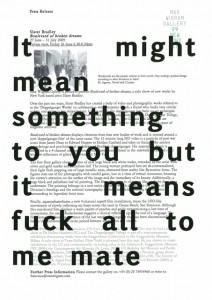DH Lawrence:
“Man is great and illimitable, while the individual is small and fragmentary. Therefore the individual must sink himself into the great whole [hole] of mankind.”
Bertrand Russell:
“If dogs were intellectual they would fight to promote the right kind of smell (Kultur) on one hand and on the other to uphold the inherent canine right of running on the pavement (Democracy).”
Lawrence wanted Russell to prove that the existing state was a prison not that all possible states were a prison- or prisons.
Russell:
“Why is man moral? Because actions against the desires of others makes him disliked, which is disagreeable to him.”
Lawrence responds with: “NO! NO! NO!”
And TS Eliot on WW1:
“Eliot didn’t mind who was being killed or why as long as they were being killed.”
The World collectively vomits, a nice idea but an undesirable everyday experience. There is a virtuosity about collectivization and the promotion of individual responsibility (Post Fordian economics being of no interest) but it is saddening when the issue of artists being personally responsible for a lot of the things they do, goes amiss, and I am not sure to what extent artists realize this. Certain other aberrations are instead amplified; again popularity against virtuosity; the world being the work, fuelling the work, instantly validating it ad infinitum, which is seen as virtuosity itself. Or, similarly, just the notion popularized in space, or the unspoken acknowledgement that most artists, thinkers, doers, hold the concept of religion in total contempt but cannot address the question of applying its virtuous aspects in making art more socially applicable, which is so clearly desired in other aspects of life. The work is in extricating meaning from the mass and the artist is left with the feeling of the converted being preached to, possibly used.
The World, though, consists of speculative knowledge, obtained from random sources, generating more speculation. I am tired of the constant modifications being made to popular culture but that is life and that is popular culture; instead, I find myself yearning for simple objects with no language, or ideas with no form. Or just residing in the notional world, happy with my own conscientiously low impact on the world. How do you convert a man hating Timon into being a participant? [1]
The World as absent but not necessarily wrong. Some Readers don’t attend much, they like very little, are resistant to change and are distrusting, some have nothing to share and are commentary wise, impeded. This is not an altogether bad thing (it certainly is socially rejected, as I’m sure this will be categorized as trolling/ or being a hater) and can actually be a default position for putting judgementality on hold (which is a commonly held ideal and is virtuous) and generally the individual phenomena are vilified on their particular characteristics that is then pinned onto the Reader. Distrust is a valid scientific position for measuring stuff, resistance is used to test strength, part manifest in abstaining from doing things- will power and the knowledge that the energy will be transferred later whilst the Reader is at the mercy of a merciless dromology. So being critically objective and socially patient can be mistaken as being miserable.
Fig 1. Defaced Slater Bradley 2009
The conflict of the question of the audience’s absence -in the Internet- versus what has become mass social participation in culture- at the expense of solitary experientiality outside of the computer. It is a rare treat to walk into a gallery and be left alone – instead being approached with hyperbole on a piece of A4 (fig 1.) or some invisible observation occurring. I like conversation in galleries, one on one- not the press release- but the obvious desire to talk about the work and share a more personal form of knowledge beyond the standard PR, it’s very refreshing and an, obviously, American trait, like the propagation of crying and hugging on TV and the over analysis of self based emotions. I no longer care where I am and I definitely don’t need cultural references, it is why I like the GPS tracker in my phone’s camera so much (fig 2.) – not because it re-affirms the notion of a demanding literal culture, or that it categorizes “stuff”/ people: the tourist/ interloper/ outsider. I just like whole techno-flanerie thing about it, or how it makes the Flaneur look redundant, or like an amateur :)
Fig 2. One day urban, one day rural No Junk Mail F OFF.
A private person goes public. Google; Apple; Web; Gallery etc.
But the World is the work… Is this some kind of horrific inertia? It’s probably far worse. People are obligated to look and participate, this mentioned time and time again by Bergson in the Two Sources of Morality and Religion. It’s just the idea of obligation in art is not extolled that much, until lately, in which we are part-indebted to social collectives, however, it does look like art has been used to appropriate its ideals and that it, understandably, has more interest in social reform rather than artistic reform, which is why I’d rather flirt with the phenomena. Also, I think there is a general social misconception that virtuosity, morals and ethics are part linked to religion and that they are conceptually dead but that is Christopher Hitchen’s and Sam Harris’ territory and I’ll write about that later.
Images courtesy of the author.
[1] Mark Fisher on responsibility and not having enough time to read/obligations of collectivization stemming from political motives
Notes:
– AC Grayling on Ray Monk’s Biography of Bertrand Russell http://www.guardian.co.uk/books/2000/oct/28/biography.philosophy
– Amnesia http://www.december.com/cmc/mag/1997/nov/dimauro.html
– Virilio kind of mentions Inertia/ Amnesia in Topographical Amnesia in The Vision Machine http://www.ctheory.net/articles.aspx?id=133

